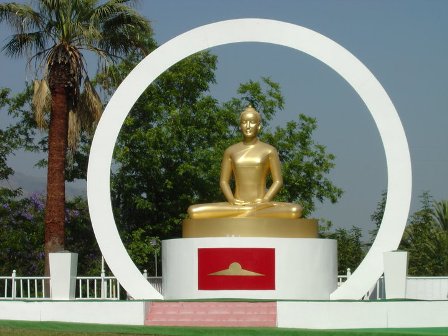Blessing Five:
Having done good deeds in one’s past
Having done good deeds in one’s past

C. ACCRUING MERIT
C1. Three Major ways to Accrue Merit
There are Ten Major Ways to Accrue Merit. As mentioned in the preceding sections, merit arises as the result of doing good deeds. Unfortunately, simply knowing that “good” is “meritorious” doesn’t explain how to go about doing good deeds. “Goodness” or “merit” can become meaningless and cliched if they are not defined in the context of practice, and for this reason that Buddhism summarizes the different ways of practice of good deeds into a collection of ten types of practice in three categories through which merit can be accrued. For the benefit of such people, the three categories of ways to accrue merit [puññākiriyavatthu] are — generosity, keeping the precepts and meditation.
1. Generosity includes merit generated through generosity, merit generated through service, merit generated through the transfer of merit to others and merit generated through rejoicing in the merit of others.
2. Keeping the Precepts includes merit generated through keeping the Precepts.
3. Meditation includes merit generated through meditation, merit generated through humility towards those of high virtue, merit generated through listening to Dhamma sermons, merit generated through giving a discourse on the Dhamma and merit generated through correcting our assumptions about the world.
C2. Ten Major Ways to accrue merit
If you expand these three categories into their ten types of practice we get the following:
1. Generosity: this means merit generated through generosity [dānamaya]. Some may wonder why merit can be accrued as the result of giving. Merit arises in the mind as explained above. The mind in its natural state takes the form of a clear sphere of diamond brightness; however, when polluted by defilements, these reduce the sparkling mind to dullness and weakness, lowering the potential of the mind. If a person does something generous, giving away some part of that wealth which is the source of their anxiety, the mind becomes more at ease. Merit arises and this merit lights up the mind for a while. The radiance gradually accrues in the mind. The brightness or the merit accumulates in the mind as generous deeds are performed regularly. The merit that arises from generosity is generated by two actions of the mind: firstly, the removal of the defilement of greed from the mind — something which immediately upgrades the quality of the mind and of our character too; secondly, as a result of the benefit obtained from the gift by the recipient — the more benefit is obtained by the recipient, especially from a gift that is hard-wearing, the more merit will be accrued by the giver. There are many different forms of generosity.
1. Giving useful material objects to others, whether it is food, clothing, shelter or medicine, will generate merit for the giver. The most basic act of generosity is the gift of something that is beneficial to the recipient [vatthudāna].
2. Giving worldly knowledge [vidhayadāna] Merit is also generated if you give the gift of knowledge that is beneficial to the recipient, of benefit to any recipient. Knowledge may be vocational skills — such as how to set oneself up as a tailor.
3. Giving spiritual knowledge [dhammadāna] of benefit to the recipient is knowledge of the Dhamma such as the advice contained in this book.
4. Forgiving: There is also a way of giving where you don't have to make any physical effort at all — when you are angry with Mr. A, Mr. B and Mr. C. All of them have at some time or other contributed trouble to your life. Suppose that one day, you decide to put an end to all the anger and forgive them for all the upsets they have caused you in the past — and start afresh. In such a case, as soon as the thought crosses you mind to forgive them, merit will arise in your mind. Even though you haven’t expended even the slightest physical effort, you have managed to earn yourself merit though giving ‘forgiveness’ [abhāyadāna]. Even giving others a smile instead of a scowl will bring you merit according to the same principle of forgiveness!
2. Humility: This means merit generated through Humility towards those of High Virtue [apacāyanamaya]. You may be surprised that even without expending any physical effort, simply possessing the attitude of humility can cause one to accrue merit. The person, who instead of finding fault with others is both humble and respectful, has a virtue that will allow him to find the good in each and every person he meets. He will put others’ faults to one side. Such humility will lead the owner to accrue merit, because at the very least, they will always see the world in a positive light, allowing them to remain in a pleasant mood the whole day long. If they are perceptive they will have the wisdom to see the virtues in the hearts of others and instil themselves with those virtues which they see in others — accruing even greater merit for themselves.
3. Service: This means merit generated through Service [veyyāvaccamaya]. This is the domain of those who immediately rush to assist others who they see doing good deeds. For example, if they find out that their neighbour is preparing a meal to offer the monks, they will prepare all the seasoning needed for the meal and give that to the neighbour making the meal.
4. Transfer of Merit: Merit generated through the transfer of merit to others [pattidānamaya]. Whenever someone does a good deed and his mind is full of merit as the result of his goodness, and he transfers some part of his merit to another person, or to his deceased relatives, these are all counted as ways of generating merit through the transfer of merit.
5. Rejoicing in the Merit of others: Merit generated through rejoicing in the merit of others [pattānumodanāmaya]. This sort of merit is accrued by those who, whenever they see that someone else has done a good deed, is pleased for them and rejoices with them in the merit that they have made. Even if they are unable to contribute anything more to that person’s merit making, by rejoicing with them or congratulating them on doing their good deed, they will earn a part of the merit for themselves too. It is in this connection that you often hear the word ‘Sadhu!’ in Buddhist circles.
6. Keeping the Precepts: Merit generated through keeping the Precepts [sīla]. Keeping the Precepts ensures that we never take advantage of others through our physical or verbal actions — and at the same time we bring no harm to ourselves. You might wonder how keeping the Precepts can possibly give rise to merit. When we abandon all thoughts of taking advantage of others, in their place arises the radiance of merit that has accrued in the mind. This will have the effect of quenching heart-felt troubles.
7. Meditation: This means merit generated through meditation [bhāvanāmaya]. Meditation is a way of training the mind to become wiser. There are many different subdivisions to what can be considered as mind training and these include reading books on Dhamma, chanting and meditation itself. Meditation has the effect on the mind of causing the arising of radiance and distancing the mind from disturbance by anxiety, limiting its habitual wandering, bringing peace. Whenever the covering of defilements is banished from the mind, especially the defilement of ignorance which usually imprisons the mind in darkness and undermines its true potential, wisdom will arise in the mind as the brightness of merit.
8. Listening to Dhamma Sermons: This means merit generated through listening to Dhamma sermons [dhammassavanamaya]. Listening to Dhamma lectures or sermons on the Dhamma will enhance our wisdom. Before, we might have had only a rudimentary understanding of the real nature of the world, but now as a result of hearing Dhamma Teachings, we know how to tell the difference between good and evil. Such an improvement in the level of our wisdom will result in our accruing merit for ourselves.
9. Giving a discourse on the Dhamma: This means merit generated through giving a Discourse on the Dhamma [dhammadesanāmaya] Teaching the Dhamma by giving a sermon will bring merit to the preacher in the following ways:
1. Preaching will rid the mind of reluctance to teach others. Some people are reluctant to share their wealth with others. Others are reluctant to share their knowledge with others. Giving a sermon, instructing others about to lead their lives virtuously, will help to uproot the trait of keeping valuable knowledge to oneself.
2. Preaching helps you to revise the different groups of dhammas. As you preach, you are able to revise the different groups of dhammas, increasing your mastery of them. As you recollect those dhammas, you will be inspired by them and this will bring radiance to the mind. Mastery also comes through the necessity to revise from the Dhamma texts, sometimes two to three weeks in advance of actually giving the sermon, in order to obtain a profound understanding of the Dhamma topic in hand before having to teach it to others.
10. Straightening One’s Views: This means merit generated through Straightening out one’s views: [diṭṭhujukammamaya]. As the result of listening to a good sermon, the listener will have the discretion to tell good from evil, right from wrong. They will no longer doubt that doing good deeds gives good results or that doing evil will bring bad results. Before long the mind is steadfast in the pursuit of good deeds and in the avoidance of evil. This process is what we mean by correcting our understanding of the world. Once our understanding is proper, then the deeds of mind, speech and body will be good and proper too. The determination will arise in the mind that you will pursue good deeds for evermore — no longer being sidetracked into evil or unproductive ways.
Thus if you it hard to remember all ten categories of meritorious deeds, you can summarize them down to three major categories: generosity, keeping the Precepts and meditation.
1. Generosity includes merit generated through generosity, merit generated through service, merit generated through the transfer of merit to others and merit generated through rejoicing in the merit of others.
2. Keeping the Precepts includes merit generated through keeping the Precepts.
3. Meditation includes merit generated through meditation, merit generated through humility towards those of high virtue, merit generated through listening to Dhamma sermons, merit generated through giving a discourse on the Dhamma and merit generated through correcting our assumptions about the world.
C2. Ten Major Ways to accrue merit
If you expand these three categories into their ten types of practice we get the following:
1. Generosity: this means merit generated through generosity [dānamaya]. Some may wonder why merit can be accrued as the result of giving. Merit arises in the mind as explained above. The mind in its natural state takes the form of a clear sphere of diamond brightness; however, when polluted by defilements, these reduce the sparkling mind to dullness and weakness, lowering the potential of the mind. If a person does something generous, giving away some part of that wealth which is the source of their anxiety, the mind becomes more at ease. Merit arises and this merit lights up the mind for a while. The radiance gradually accrues in the mind. The brightness or the merit accumulates in the mind as generous deeds are performed regularly. The merit that arises from generosity is generated by two actions of the mind: firstly, the removal of the defilement of greed from the mind — something which immediately upgrades the quality of the mind and of our character too; secondly, as a result of the benefit obtained from the gift by the recipient — the more benefit is obtained by the recipient, especially from a gift that is hard-wearing, the more merit will be accrued by the giver. There are many different forms of generosity.
1. Giving useful material objects to others, whether it is food, clothing, shelter or medicine, will generate merit for the giver. The most basic act of generosity is the gift of something that is beneficial to the recipient [vatthudāna].
2. Giving worldly knowledge [vidhayadāna] Merit is also generated if you give the gift of knowledge that is beneficial to the recipient, of benefit to any recipient. Knowledge may be vocational skills — such as how to set oneself up as a tailor.
3. Giving spiritual knowledge [dhammadāna] of benefit to the recipient is knowledge of the Dhamma such as the advice contained in this book.
4. Forgiving: There is also a way of giving where you don't have to make any physical effort at all — when you are angry with Mr. A, Mr. B and Mr. C. All of them have at some time or other contributed trouble to your life. Suppose that one day, you decide to put an end to all the anger and forgive them for all the upsets they have caused you in the past — and start afresh. In such a case, as soon as the thought crosses you mind to forgive them, merit will arise in your mind. Even though you haven’t expended even the slightest physical effort, you have managed to earn yourself merit though giving ‘forgiveness’ [abhāyadāna]. Even giving others a smile instead of a scowl will bring you merit according to the same principle of forgiveness!
2. Humility: This means merit generated through Humility towards those of High Virtue [apacāyanamaya]. You may be surprised that even without expending any physical effort, simply possessing the attitude of humility can cause one to accrue merit. The person, who instead of finding fault with others is both humble and respectful, has a virtue that will allow him to find the good in each and every person he meets. He will put others’ faults to one side. Such humility will lead the owner to accrue merit, because at the very least, they will always see the world in a positive light, allowing them to remain in a pleasant mood the whole day long. If they are perceptive they will have the wisdom to see the virtues in the hearts of others and instil themselves with those virtues which they see in others — accruing even greater merit for themselves.
3. Service: This means merit generated through Service [veyyāvaccamaya]. This is the domain of those who immediately rush to assist others who they see doing good deeds. For example, if they find out that their neighbour is preparing a meal to offer the monks, they will prepare all the seasoning needed for the meal and give that to the neighbour making the meal.
4. Transfer of Merit: Merit generated through the transfer of merit to others [pattidānamaya]. Whenever someone does a good deed and his mind is full of merit as the result of his goodness, and he transfers some part of his merit to another person, or to his deceased relatives, these are all counted as ways of generating merit through the transfer of merit.
5. Rejoicing in the Merit of others: Merit generated through rejoicing in the merit of others [pattānumodanāmaya]. This sort of merit is accrued by those who, whenever they see that someone else has done a good deed, is pleased for them and rejoices with them in the merit that they have made. Even if they are unable to contribute anything more to that person’s merit making, by rejoicing with them or congratulating them on doing their good deed, they will earn a part of the merit for themselves too. It is in this connection that you often hear the word ‘Sadhu!’ in Buddhist circles.
6. Keeping the Precepts: Merit generated through keeping the Precepts [sīla]. Keeping the Precepts ensures that we never take advantage of others through our physical or verbal actions — and at the same time we bring no harm to ourselves. You might wonder how keeping the Precepts can possibly give rise to merit. When we abandon all thoughts of taking advantage of others, in their place arises the radiance of merit that has accrued in the mind. This will have the effect of quenching heart-felt troubles.
7. Meditation: This means merit generated through meditation [bhāvanāmaya]. Meditation is a way of training the mind to become wiser. There are many different subdivisions to what can be considered as mind training and these include reading books on Dhamma, chanting and meditation itself. Meditation has the effect on the mind of causing the arising of radiance and distancing the mind from disturbance by anxiety, limiting its habitual wandering, bringing peace. Whenever the covering of defilements is banished from the mind, especially the defilement of ignorance which usually imprisons the mind in darkness and undermines its true potential, wisdom will arise in the mind as the brightness of merit.
8. Listening to Dhamma Sermons: This means merit generated through listening to Dhamma sermons [dhammassavanamaya]. Listening to Dhamma lectures or sermons on the Dhamma will enhance our wisdom. Before, we might have had only a rudimentary understanding of the real nature of the world, but now as a result of hearing Dhamma Teachings, we know how to tell the difference between good and evil. Such an improvement in the level of our wisdom will result in our accruing merit for ourselves.
9. Giving a discourse on the Dhamma: This means merit generated through giving a Discourse on the Dhamma [dhammadesanāmaya] Teaching the Dhamma by giving a sermon will bring merit to the preacher in the following ways:
1. Preaching will rid the mind of reluctance to teach others. Some people are reluctant to share their wealth with others. Others are reluctant to share their knowledge with others. Giving a sermon, instructing others about to lead their lives virtuously, will help to uproot the trait of keeping valuable knowledge to oneself.
2. Preaching helps you to revise the different groups of dhammas. As you preach, you are able to revise the different groups of dhammas, increasing your mastery of them. As you recollect those dhammas, you will be inspired by them and this will bring radiance to the mind. Mastery also comes through the necessity to revise from the Dhamma texts, sometimes two to three weeks in advance of actually giving the sermon, in order to obtain a profound understanding of the Dhamma topic in hand before having to teach it to others.
10. Straightening One’s Views: This means merit generated through Straightening out one’s views: [diṭṭhujukammamaya]. As the result of listening to a good sermon, the listener will have the discretion to tell good from evil, right from wrong. They will no longer doubt that doing good deeds gives good results or that doing evil will bring bad results. Before long the mind is steadfast in the pursuit of good deeds and in the avoidance of evil. This process is what we mean by correcting our understanding of the world. Once our understanding is proper, then the deeds of mind, speech and body will be good and proper too. The determination will arise in the mind that you will pursue good deeds for evermore — no longer being sidetracked into evil or unproductive ways.
Thus if you it hard to remember all ten categories of meritorious deeds, you can summarize them down to three major categories: generosity, keeping the Precepts and meditation.










